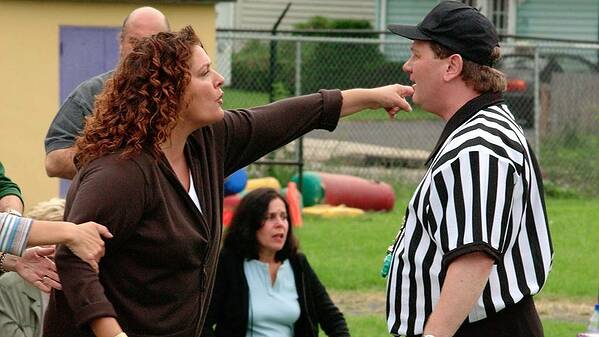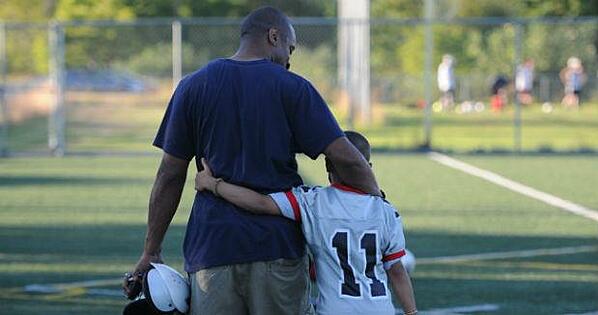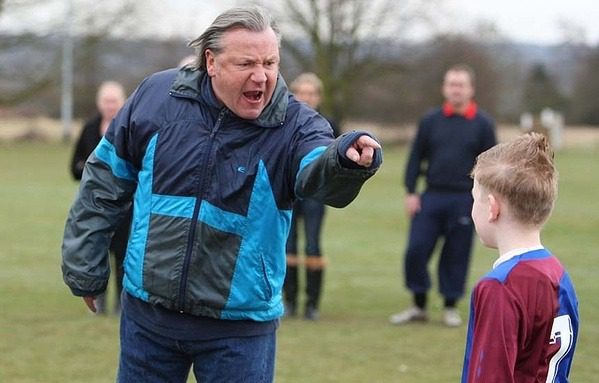Youth Sports Part 1: Getting Bad Sports Parents to Behave Better
Coach DevelopmentABOUT THE AUTHOR

Phil White
Phil White is the co-author of Waterman 2.0 (with Dr. Kelly Starrett), The 17 Hour Fast (with Dr. Frank Merritt), Unplugged (with Dr. Andy Galpin and Brian Mackenzie) and Game Changer (with Fergus Connolly). He writes for Train Heroic, HANAH, Momentous, XPT, Onnit, StrongFirst, TRX, McGregor FAST, and other leaders in human performance. In a previous life, Phil was nominated for a screenwriting Emmy. He lives with his wife and two sons in the mountains of Colorado. Connect with Phil at www.philwhitebooks.com
One of the reasons for your discomfort is probably that you feel bad for the kids on the receiving end of such over-the-top “hyper-parenting.” But if you’re a youth sports coach, you might watch Bell’s documentary series nodding your head because, unfortunately, you’ve been subjected to the rants of irate parents who think their kid should be the star player.
There are cultural factors at work here that are far outside the scope of this article. We’re witnessing an “activities arms race” in which all too many parents feel obliged to keep up with the Joneses by filling every second of children’s lives with activity.
This is largely an extension of how we as adults approach our work and personal lives, overstuffing our calendars, over-extending our commitments, and overdosing on our social media feeds in whatever few minutes are left over each day. The perma-stress created by such hectic lifestyles starts to bubble up through the cracks, which we see manifested in the worst possible way in the outbursts on soccer sidelines and Little League bleachers.
Cultural commentary aside, what are we actually going to do about this issue? We might not be able to solve the parenting-related problems of all the 45 million kids who play organized sports in the U.S., but perhaps we can at least help you create a positive, tantrum-free environment for the few you’re committed to coaching. Here goes…
// Setting Expectations
It’s arguable that people with frustrated athletic ambitions (think Uncle Rico in Napoleon Dynamite: “If coach would’ve put me in, we would’ve won state.”) make the worst sports parents, as they’re unfairly trying to atone for their own shortcomings by putting pressure on their children to perform. It’s not your role to play counselor and try to sort out the psychological issues of every parent who decides to behave badly on the sideline. On the other hand, you cannot allow them to disrupt your practices and make game day miserable for everyone.

One way to strike a balance is to establish some ground rules from day one said Whitey Nelson who works with everyone from former international players to under-7 youth teams through his club Misfits Rugby.
“We invite everybody to get together at a pre-season meet-and-greet where parents and their kids can get to know me and my assistant coach,” Nelson said. “This gives me the opportunity to find out what they expect from us and our program, and then for us to set expectations for them on and off the field. For example, there’s a reason we always call the referee ‘sir’ or ‘ma’am’ – because it conveys respect. This meeting also allows us to explain our culture and values, what the kids will get out of rugby, and why they should play in the first place. This helps to set the tone for the season and encourages candid dialogue from day one.”
Building on Nelson’s approach, you should make it clear that while parents are welcome at practice, they cannot interrupt drills or yell at their child, other kids, or you. And they need to stay out of the actual training area.
You might also need to outline the consequences if a parent starts acting up: they’ll be asked to leave.
Having set such a boundary, you must ruthlessly enforce it. If a mom or dad violates a rule, remind them of it, and be clear that if it happens again, there will be consequences. It’s all too tempting for youth coaches to mollify parents because they’re scared of a mutiny or the team falling apart if too many parents turn against them. But just as teachers in the classroom have to differentiate between what’s acceptable (a polite email exchange about a perceived issue) and unacceptable (interfering with grading), so too must the coach.
And when problems do arise, you need to be proactive and tackle them head on.
“We recently had a Dad who was yelling a lot during a game in a way that was inappropriate,” Nelson said. “Afterwards I asked him why he was so frustrated. He explained that his son wasn’t playing enough. I thought about it for a minute and recognized that he was right. So I apologized and resolved to give his child more of an opportunity in the next game. Then I reminded him that I am an unpaid volunteer who’s trying to manage 60 kids across various teams, as well as having a full-time job, coaching adults, and trying to be a good father and husband. Once he realized that I wasn’t being paid and that our lives were pretty similar, it reset his expectations and helped him value my time more. And because I gave him a voice, he felt that he was being listened to.”
// Modeling the Behavior You Expect

If you want parents to act politely and courteously toward you, your fellow coaches, and game officials, but you treat them like dirt, you’re going to create a dissonance between what you preach and what you practice. Make sure you’re consistent in leading by example and displaying the kind of behavior you’re asking from parents.
The same extends to the children in your charge. If you scream, criticize, and embarrass, then you’re creating a culture that says it’s OK for their parents to do the same both at your practices/games and away from the court, field, or pitch. Instead, try to instruct firmly but without raising your voice, be a constant encourager, and, if a child has a certain issue, talk to them about it away from the group so you don’t shame them in front of their peers.
Such a modus operandi mimics some of the best coaches in the adult sporting world, according to performance specialist and Game Changer author Fergus Connolly.
“When I consulted at Liverpool FC, Brendan Rodgers never had a bad word to say to the team but was always positive,” Connolly said. “At Welsh Rugby, Warren Gatland had a similar approach. He didn’t have much to say to the players during training, but when he did speak, it was to encourage and to break tension with humor. He also smiled a lot, which set the tone for the players. Such things are just as effective at the youth level. If you want well behaved and friendly kids and parents, you have to act that way.”
// Establishing and Maintaining Lines of Communication
One of the issues with bad sports parents is that they’re constantly trying to tell you how to do your job (or, quite likely, your volunteer-basis vocation). We see this in armchair quarterbacking at practices and even more so at games where parents suddenly become self-appointed experts on everything from formation to tactics to substitution patterns.
And if a mom or dad has played the sport themselves, the issue can be exacerbated because they think this lends them credibility to shoot holes in your coaching, lambast the referees, and yell at the kids.
Try to get ahead of such problems by creating an opportunity for parents to speak their mind outside of practice and away from games. Be clear that you don’t think your coaching is perfect and that you welcome suggestions, but that the time for these is before or after practice, not in the middle of it. If you engage in conversation during these times and proactively seek feedback, you’ll foster positive two-way communication.
You can also provide your email address and, if you’re comfortable with giving it out, your phone number and let parents know you’d welcome the chance to discuss issues.
// Preventing a Coaches/Parents Civil War
Once a forceful parent or two turn against their children’s coach, it’s possible for them to poison the well and create an us-and-them divide between their fellow parents and you. To prevent this from happening, you don’t need to become everybody’s best friend, but there are some things you can do to create a sense of comradery and teamwork.
One is to ask volunteers to perform certain tasks, which allows you to delegate responsibility without abdicating.
“The best teams in the world entrust people with responsibility, as it gives everyone a sense of ownership,” Connolly said. “It might be something small, but to the person performing the task, it’s bigger than just picking up cones after practice or helping clean up the locker room. Giving people responsibility makes them feel like they’re a real part of the team and encourages leadership.”
With this in mind, send an email to all parents at the beginning of the season asking people to sign up for certain tasks. Maybe it’s a regular thing like bringing a cooler full of bottled water to each practice or washing game jerseys.
You can also ask for help on the spot as needed. For example, if a one-car family calls to say they can’t make it to practice tonight because their vehicle is in the shop, maybe you fire off a group text asking if somebody can pick the child up and drop them off. Such things foster a sense of community that goes far beyond simply hosting an end-of-year pizza party.
// Keeping the Team Together
Despite your best efforts and giving a parent several chances to improve their behavior, there may be a couple of repeat offenders who continue to undermine your team’s values and standards. Rather than kicking them out, Nelson takes a more constructive approach to solving this thorny problem:
“If a parent has behaved disruptively or disrespectfully over and over despite me talking with them, I put the focus back on their son or daughter,” he said.

“I remind them that we’re giving their child the chance not only to learn a wonderful sport, but also to improve as a human being. Is it worth denying their son or daughter this opportunity because they feel the need to yell and scream? Then I explain that my daughters are becoming confident young women who speak up for those who don’t have a voice simply because they’re playing rugby. I ask them to imagine how much their child would grow if they stay with the team. Then I make it clear that for this to happen, the adult needs to start acting like one. If they can’t, we’ll gladly refund their fees. But we’d prefer to remedy the situation and keep them and their kid around. More often than not, we see this mom or dad radically change, and their child thrives.”
Check back soon for part 2 in our youth sports series.
Are you a better coach after reading this?
More coaches and athletes than ever are reading the TrainHeroic blog, and it’s our mission to support them with useful training & coaching content. If you found this article useful, please take a moment to share it on social media, engage with the author, and link to this article on your own blog or any forums you post on.
Be Your Best,
TrainHeroic Content Team
HEROIC SOCIAL
HEROIC SOCIAL
TRAINING LAB
Access the latest articles, reviews, and case studies from the top strength and conditioning minds in the TH Training Lab

